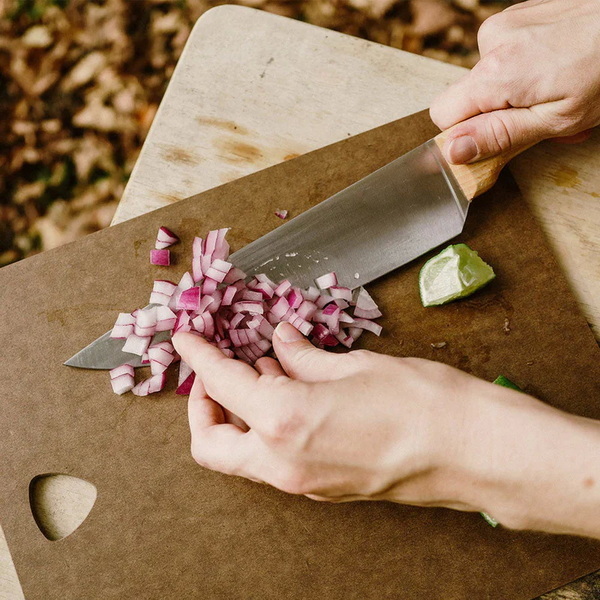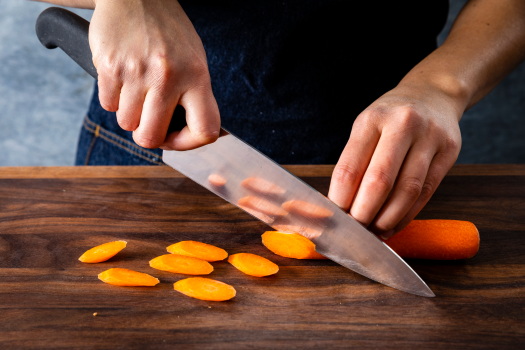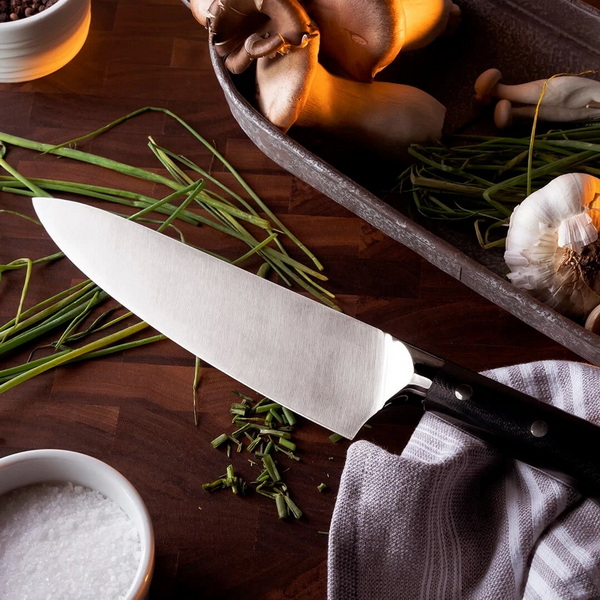

Views: 222 Author: Ella Publish Time: 2025-05-25 Origin: Site








Content Menu
● Understanding Australian Knife Laws
>> Legal Status of Cooking Knives
>> Prohibited and Restricted Knives
● Bringing Cooking Knives into Australia: What You Need to Know
>> Can You Bring Cooking Knives on a Plane?
>> Declaring Knives at Customs
● How to Pack Cooking Knives for Air Travel to Australia
● Importing Knives by Mail or Shipping
● Airline Policies on Knives in Checked Luggage
● Regional Differences and Enforcement
● FAQ
>> 1. Can I bring kitchen knives in my carry-on luggage to Australia?
>> 2. What types of knives are banned from being brought into Australia?
>> 3. Do I need to declare cooking knives at Australian customs?
>> 4. How should I pack cooking knives for checked luggage?
>> 5. Are there import duties or taxes on bringing knives into Australia?
Bringing cooking knives into Australia is a topic that often raises questions for travelers, chefs, and expatriates. Australia's strict regulations on knives and weapons mean that understanding what is allowed, how to pack knives properly, and what legal considerations apply is essential. This article provides a detailed guide to help you navigate the rules, avoid confiscation, and travel with your cooking knives safely and legally.

In Australia, kitchen knives such as chef's knives, paring knives, and utility knives are legal to own and bring into the country for legitimate purposes like cooking and food preparation. These knives are not classified as prohibited weapons and are generally allowed, provided they are used responsibly and declared when necessary.
However, it is important to note that carrying knives in public places without a lawful excuse is illegal. Lawful excuses include work-related use (e.g., chefs, butchers), food preparation, or sporting activities. Carrying a kitchen knife in public without a valid reason can lead to fines or legal consequences.
Australia bans certain types of knives outright or restricts their possession. These include:
- Automatic knives (switchblades)
- Butterfly knives (balisongs)
- Flick knives
- Push knives
- Knives designed or adapted as weapons
- Knives with concealed blades or disguised as other objects
Possessing or attempting to bring these knives into Australia without permits can result in confiscation, fines, or criminal charges.
In 2025, several Australian states introduced tougher knife laws to tackle knife crime. For instance, South Australia has enacted legislation expanding police powers to conduct wanding searches in shopping centers, public transport hubs, and licensed venues. The laws also prohibit the sale and supply of knives to minors and require secure storage of knives in retail premises. Victoria has introduced the country's first-ever machete ban, classifying machetes as prohibited weapons from September 2025, with exemptions for agricultural or hunting purposes under strict conditions.
These reforms reflect a nationwide trend toward stricter control of knives to improve public safety.
- Carry-on luggage: Knives, including cooking knives, are strictly prohibited in carry-on luggage on all flights to and within Australia. Security screening will confiscate any knives found in carry-ons.
- Checked luggage: Cooking knives are generally allowed in checked luggage if they are securely packed to prevent injury to baggage handlers and inspectors.
When entering Australia, you must declare knives if:
- They are for commercial purposes or resale.
- They exceed typical household use, such as part of a collection or antiques.
- They fall under restricted categories or are considered weapons.
Failing to declare knives when required can lead to confiscation and penalties.

Proper packing is crucial for safety and compliance with airline and customs regulations.
1. Use Knife Guards or Sheaths: Protect the blade with a sheath or knife guard to cover sharp edges and prevent injury.
2. Wrap the Knives: Wrap knives in bubble wrap, foam padding, or thick cloth to cushion them and prevent movement.
3. Secure with Tape: Use tape to keep the wrapping intact and avoid accidental exposure of the blades.
4. Place in Hard-Sided Luggage: Use a hard-sided suitcase or a dedicated knife case inside your luggage for extra protection.
5. Separate from Other Items: Store knives in a designated compartment or box to minimize shifting during transit.
6. Include a Declaration Note: Place a note inside the luggage indicating the presence of cooking knives to assist customs officers during inspection.
- Ensure knives are clean and dry to avoid rust or contamination.
- Keep knives sharp before travel; sharp knives are safer to handle.
- Check your airline's specific policies and inform them at check-in if carrying knives.
If you plan to ship knives to Australia, be aware that:
- Certain knives may require permits or be prohibited.
- Customs may inspect and seize prohibited knives.
- Import duties and GST may apply if the value exceeds AUD 1000.
- Accurate declaration is mandatory to avoid penalties.
Different airlines may have specific rules regarding knives in checked luggage. Generally:
Airline | Policy Summary |
Qantas | Allows knives in checked luggage if properly packed and not classified as dangerous goods. |
Virgin Australia | Permits knives in checked luggage with secure packaging; notify airline at check-in. |
Jetstar | Allows knives but prohibits weapon-like designs; check airline website for details. |
Always confirm with your airline before traveling.
Australia's states and territories have variations in knife laws and enforcement:
- South Australia: Recently passed the toughest knife laws in the country, including bans on selling knives to minors and expanded police search powers.
- Victoria: Introduced a machete ban effective September 2025, with an amnesty period for safe disposal.
- New South Wales: Enacted laws modeled on Queensland's ‘Jack's Law,' allowing police to conduct wand searches in designated areas to reduce knife crime.
- Western Australia: Increased penalties for knife-related offences and strict controls on edged weapons.
Travelers should be aware of these regional differences, especially if moving between states.
While bringing cooking knives into Australia is generally allowed for legitimate culinary purposes, it is critical to handle and transport them responsibly. Avoid carrying knives in public without a valid reason, comply with all packaging and declaration requirements, and stay informed about the latest legal changes.
Bringing cooking knives into Australia is permissible when done correctly. Kitchen knives are allowed in checked luggage if packed securely and declared when necessary. Prohibited knives, such as automatic or butterfly knives, are banned and can result in confiscation or legal trouble. Recent legislative reforms across Australian states have tightened controls on knife possession, sales, and public carrying to combat knife crime.
By understanding the laws, following airline policies, and packing your knives safely, you can ensure your culinary tools arrive in Australia without issues. Always check the latest regulations from Australian Border Force and your airline before traveling.

No. All knives, including cooking knives, are prohibited in carry-on luggage on flights to and within Australia. They must be packed in checked luggage.
Knives such as automatic knives, butterfly knives, flick knives, push knives, and disguised blades are banned. Possession without permits can lead to confiscation and penalties.
Yes. You must declare knives if they are for commercial use, part of a collection, or exceed normal household use. Failure to declare can result in fines or confiscation.
Use protective sheaths, wrap knives securely in bubble wrap or cloth, place them in a hard-sided suitcase, and consider including a note declaring the knives inside.
For personal use, knives valued under AUD 1000 typically do not incur GST or import duties. Higher-value imports may be subject to taxes and fees.